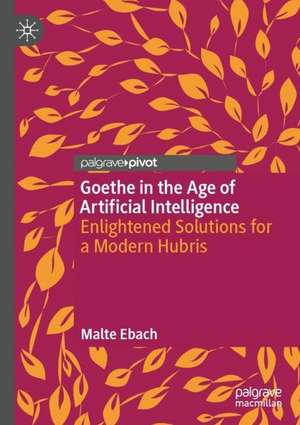Goethe in the Age of Artificial Intelligence: Enlightened Solutions for a Modern Hubris
Autor Malte Ebachen Limba Engleză Hardback – 25 ian 2023
Preț: 351.60 lei
Nou
Puncte Express: 527
Preț estimativ în valută:
67.30€ • 73.13$ • 56.57£
67.30€ • 73.13$ • 56.57£
Carte tipărită la comandă
Livrare economică 21 aprilie-05 mai
Preluare comenzi: 021 569.72.76
Specificații
ISBN-13: 9789811967405
ISBN-10: 9811967407
Pagini: 130
Ilustrații: XXII, 130 p. 25 illus.
Dimensiuni: 148 x 210 mm
Greutate: 0.34 kg
Ediția:1st ed. 2022
Editura: Springer Nature Singapore
Colecția Palgrave Macmillan
Locul publicării:Singapore, Singapore
ISBN-10: 9811967407
Pagini: 130
Ilustrații: XXII, 130 p. 25 illus.
Dimensiuni: 148 x 210 mm
Greutate: 0.34 kg
Ediția:1st ed. 2022
Editura: Springer Nature Singapore
Colecția Palgrave Macmillan
Locul publicării:Singapore, Singapore
Cuprins
Chapter 1 Goethe in the Age of AI.- Chapter 2. A.I. and the Modern Hubris.- Chapter 3. Goethe and the Birth of the Modern Hubris.- Chapter 4. Anschauung and the Urphenomenon and the Path to Discovery.- Chapter 5. How to Remedy Direct Observation.- Chapter 6. Getting Rid of Bad Metaphysics.- Chapter 7. Goethe’s Italian Journey and the Transformation of Self.
Notă biografică
Dr. Malte C. Ebach is a multidisciplinary scientist, a natural historian, author and editor of several books on biogeography, biological systematics and the history of biogeography. He is an honorary associate professor at the University of New South Wales, Sydney, an associate researcher at the Australian Museum, and a fellow of the Royal Society of New South Wales (FRSN). He has a passion for Goethe’s scientific endeavours and how Goethe’s experiences formulated his view of how science and the natural world change us.
Textul de pe ultima copertă
Malte Ebach has managed to provide fresh insights by situating Goethe’s alternative mode of science within the larger contemporary problems associated with artificial intelligence and big data. The result is Goethe is not treated as a historical phenomenon, but rather as highly relevant to the issues of today.
— Frederick Amrine, Arthur F. Thurnau Professor, The University of Michigan.
Inside you lies a precise scientific instrument – the ability to observe Nature and recall past experiences. You were born with it and you use it every day. You can be trained to use it more effectively to, for example, compare and discover new species of organisms or new minerals. Our senses do have limitations, and we often use microscopes, telescopes and other tools to aid our observation. However, we benefit from knowing their limitations and the impact they have on our ability to combine our observations and our experience to make decisions. Once these tools replace our direct observation and our experience we ourselves become disconnected from Nature. Scientific practice turns into well-meant opinions out-weighing empirical evidence. This is happening now in the current age of big data and artificial intelligence. The author calls this the Modern Hubris and it is slowly corroding science. To combat the Modern Hubris and to reconnect with Nature, scientists need to change the way they practise observation. To do so may require the scientist to transform themself. One person who successfully did this was Johann Wolfgang von Goethe. His journey demonstrates how one man attempted to take on the Modern Hubris by transforming his life and how he saw Nature. Following Goethe’s transformation teaches us how we can also reconnect ourselves with Nature and Natural science.
Dr. Malte C. Ebach is a multidisciplinary scientist, a natural historian, author and editor of several books on biogeography, biological systematics and the history of biogeography. He is an honorary associate professor at the University of New South Wales, Sydney, an associate researcher at the Australian Museum, and a fellow of the Royal Society of New South Wales (FRSN). He has a passion for Goethe’s scientific endeavours and how Goethe’s experiences formulated his view of how science and the natural world change us.
Caracteristici
Discusses how Goethe’s scientific method impacts how AI and big data are slowly replacing observation and experience Helps readers explore fundamental assumptions about our experience of Nature Argues how technology is replacing scientific expertise and our own experience of Nature
